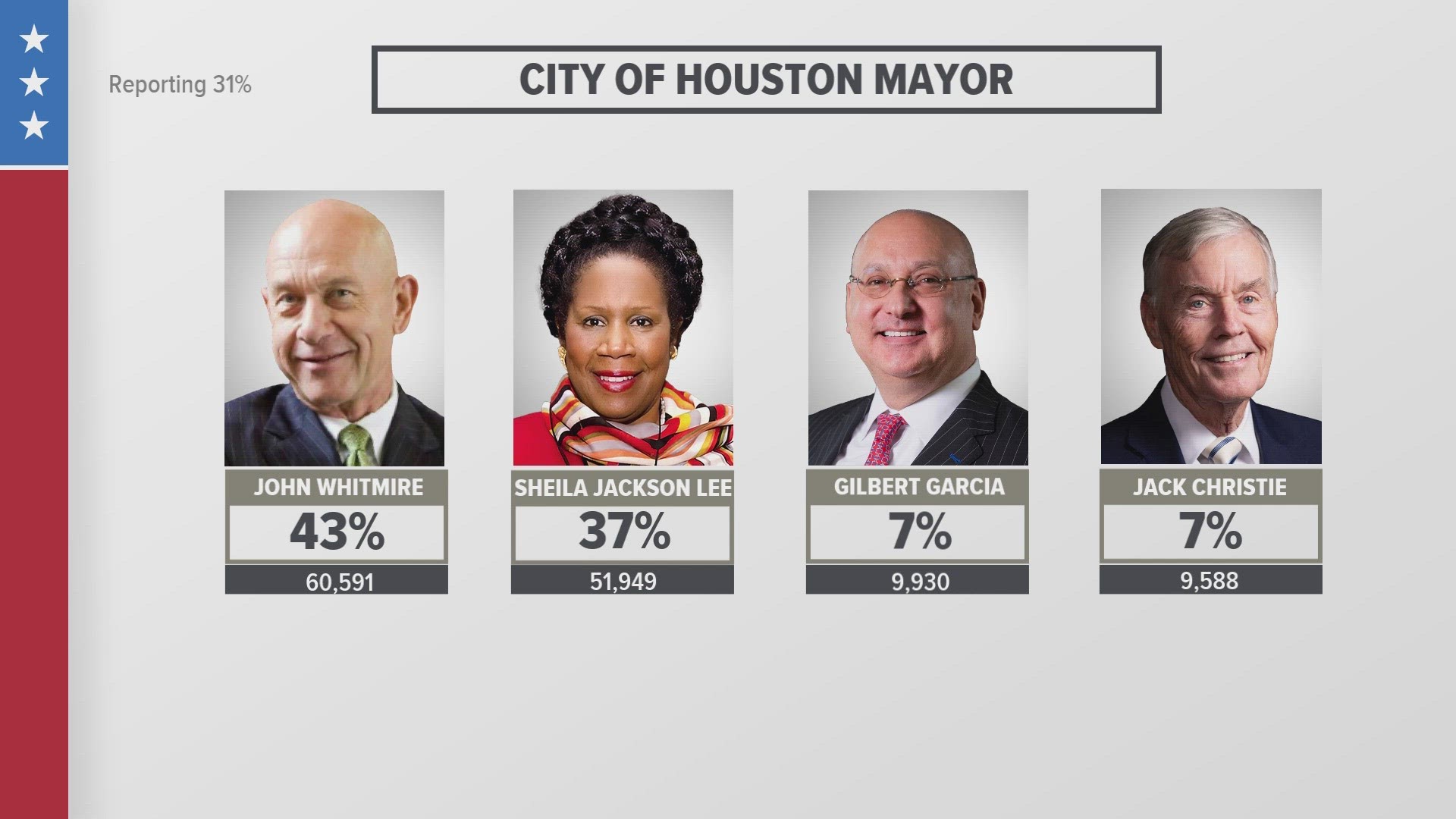HOUSTON — The race for Houston mayor is headed to a runoff between U.S. Rep. Sheila Jackson Lee and state Sen. John Whitmire.
Houston voters will head to the polls again on Dec. 9 to vote for the city's next mayor.
Jackson Lee and Whitmire have dominated a crowded mayoral race that drew 17 candidates to the ballot and one write-in candidate. Crime, crumbling infrastructure, and potential budget shortfalls are some of the issues highlighted by candidates.
If elected, Jackson Lee would be Houston’s first Black female mayor. Since 1995, she has represented Houston in Congress.
Whitmire has spent five decades in the Texas Legislature, where he has helped drive policies that were tough on crime while casting himself as a reformer.
When is Houston's runoff election?
Dec. 9 is the official date for this year's runoff election. However, you must register by Nov. 9 to be eligible to vote in the runoff election
Download an application or visit any Harris County Clerk's Office Elections Department location and submit your completed, signed form from 8 a.m. to 4:30 p.m.
- 1001 Preston, Houston, Texas, 77002 (Main Office)
- 6000 Chimney Rock Rd., Houston, Texas 77081 (Bellaire)
- 16715 Clay Rd. Houston, Texas 77084 (Clay Rd)
- 14350 Wallisville Rd., Houston, Texas 77049 (Jim Fonteno)
- 101 S. Richey, Suite E, Pasadena, Texas 77506 (John Phelps)
- 7300 N. Shepherd Dr, Houston, Texas 77091 (Mickey Leland)
- 5300 Griggs Rd., Houston, Texas 77021 (Palm Center)
- 1001 SGT Macario Garcia, Houston, Texas 77011 (Raul C. Martinez)
- 1721 Pech Rd., Houston, Texas 77055 (Spring Branch)
Who can vote in a runoff election?
Anyone who is registered to vote in Texas can vote in state, local and federal runoff elections. Even if you did not vote in the general election, you could vote in the runoff.
If you've already registered with the state, you don't need to register again - though it doesn't hurt to check your status on the Secretary of State's My Voter Portal.
Sadly, if you were not registered by Nov. 9, you will not be able to vote in the runoff election, according to the Secretary of State Office.
What is a runoff election?
In some states, winners are determined by a plurality - or whoever has the highest amount of votes wins. In these cases, the candidate does not have to win an outright majority to be elected.
Here in Texas, however, in order to be declared the winner in an election, a candidate must receive at least 50% plus one vote. If that does not take place, under Texas law, the race automatically goes to a runoff between the top two vote-getters.
A runoff, then, is another chance for voters to cast a ballot in order to determine a winner.
Why do runoffs exist?
According to a 2014 analysis by the Washington Post, runoffs are a vestige of a time when white Democrats controlled Southern politics and manipulated election rules to remain in power.
The Post article quoted University of Georgia political scientist Charles Bullock, who said that in the days when the Democrats were the only party in town, the runoff was often the "determinative election." Often, in those days, Bullock said, there were "more people participating in the runoff than in the original primary."
According to the Post's article, the runoff system was used, along with literacy tests, poll taxes, and other hurdles to keep African Americans away from the ballot box.
In recent years, Texas is one of seven states - along with Alabama, Arkansas, Georgia, Mississippi, Oklahoma and South Carolina - where runoffs are required if a single candidate does not receive at least one vote beyond a 50% threshold in a primary election. In two other states, the bar is even lower: 40% in North Carolina and 35% in Louisiana. South Dakota and Vermont have very limited instances in which they use runoffs, according to Ballotpedia.

